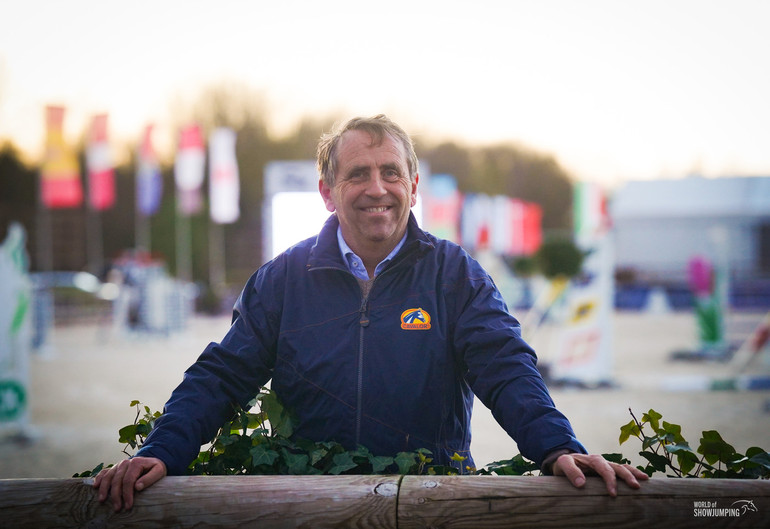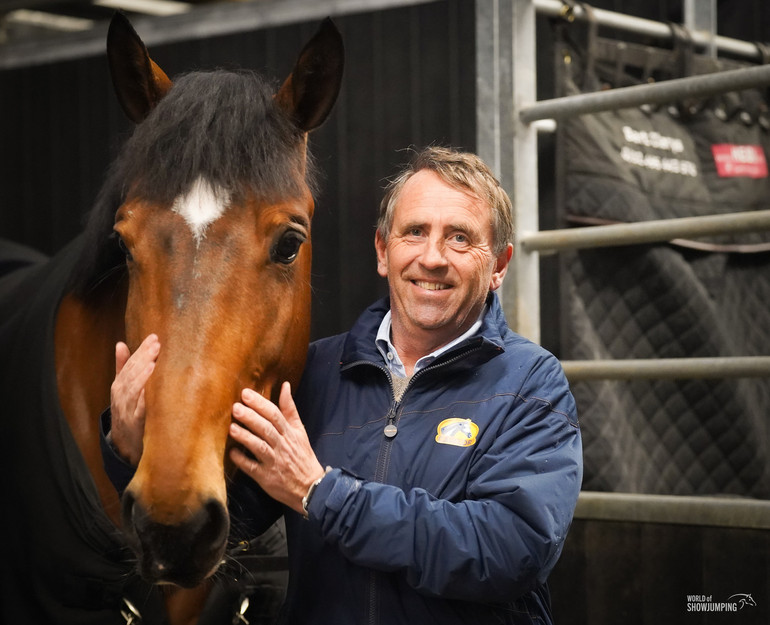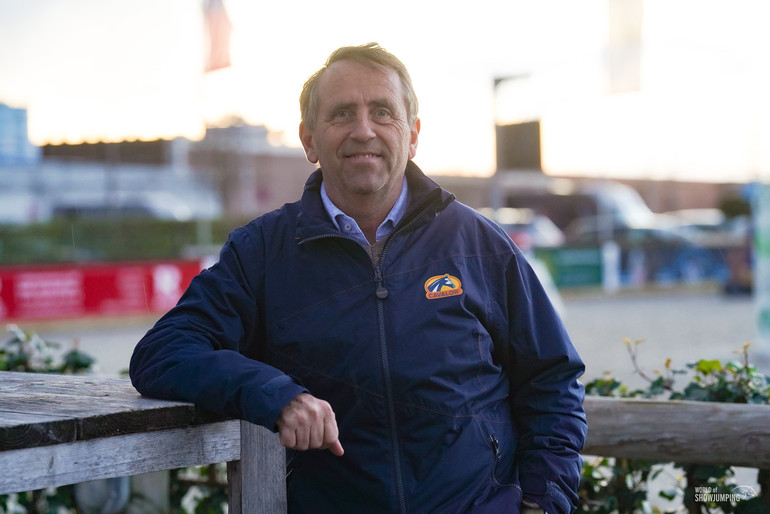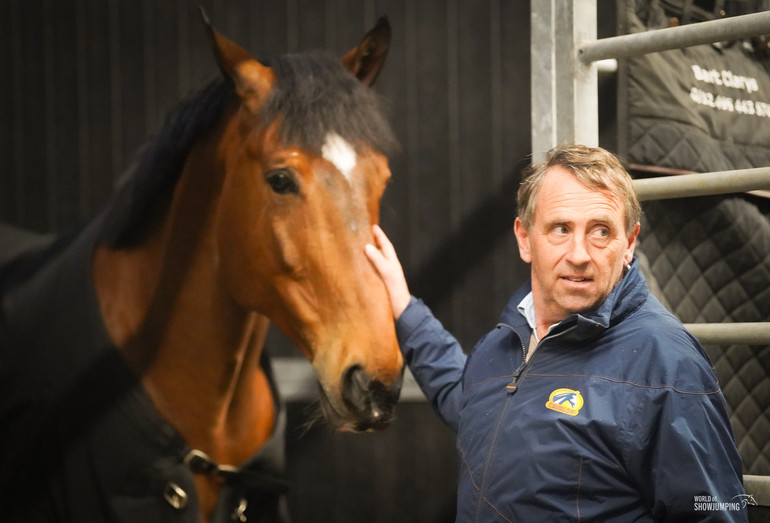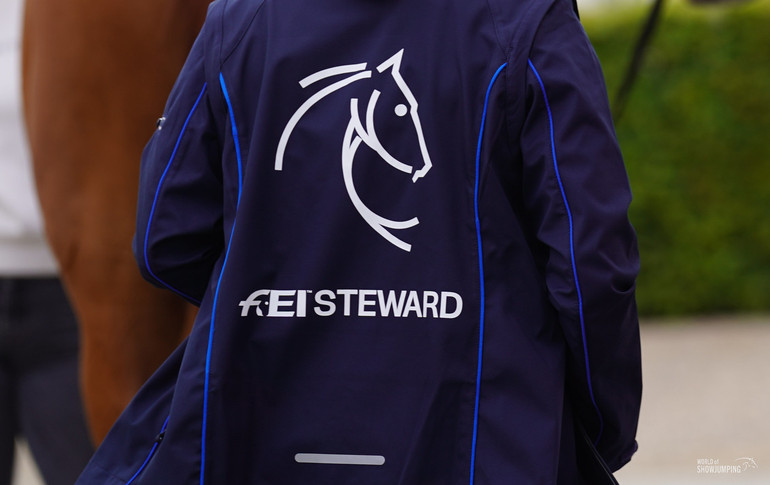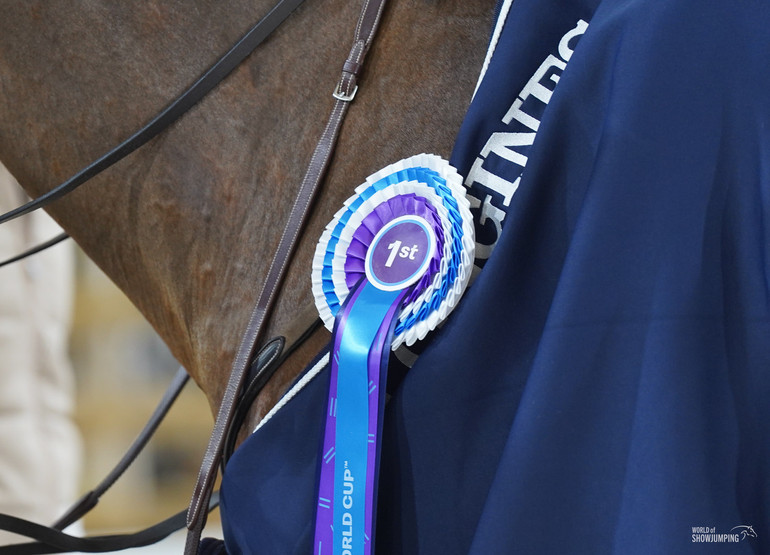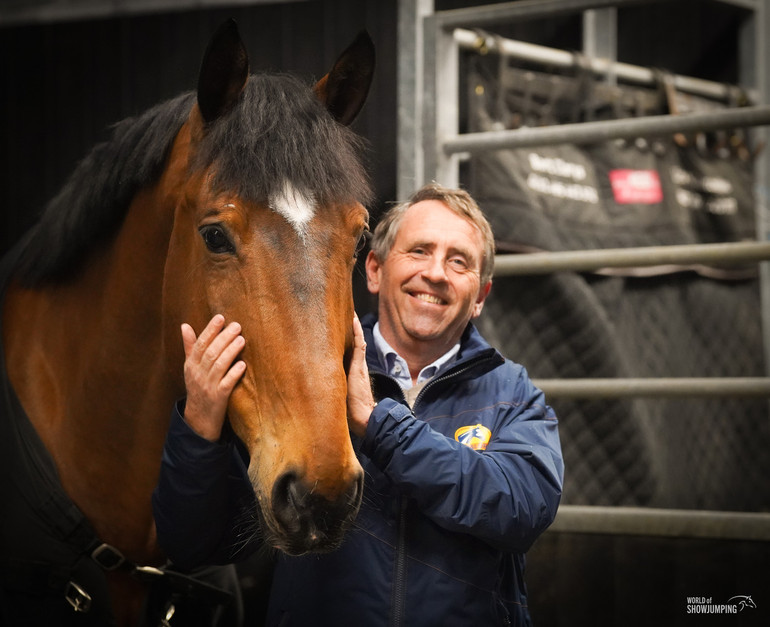Text © World of Showjumping
"I have seen the sport from all different angles,” Peter Bollen, who for the last 12 years has been the President of the Equestrian Organisers (EO), tells WoSJ. “I still enjoy watching a nice jump-off where the crowd is enthusiastic, but what I like the most is mucking out stables and being around the horses at home. That's still the best part of my day; going back to my roots where it all began.”
Next to being President of the EO – an organization founded in 1995 that has signed an MOU with the FEI – the 59-year-old Belgian is event director of Jumping Mechelen, founder and head nutritionist of Cavalor, board member of the European Horse Network (EHN), and is also involved in European Horse Services, as well as Mares of Macha. “I started as a groom,” Bollen explains. “Not a professional groom though but just as a hobby, and then I competed a bit myself from when I was in my teenage years. I stopped competing actively about ten years ago, and now I'm breeding horses, as well as being a horse owner and trainer for my kids – driving the truck and grooming for them as well!”
Commercial sport versus true sport
“Our sport has become more and more professional on every level, from the low levels especially, to the very top,” Bollen says about the evolution he has witnessed. “Even though we hear people say that equestrian sports are only for the happy few who are very rich, I don't think that's true. I believe that it depends on how you want to do our sport; in my opinion, there are still enough opportunities. Naturally, if you want to go to a nice international show every week, it costs money. However, if you keep it small, then it is not that expensive – it all depends on your approach.”
“At the moment, the biggest issue for me is horsemanship, or more so the lack of it,” Bollen continues. “It becomes a problem when people with no agricultural background, some never having had an animal to take care of, come into the sport and think that they can buy everything with money. It's something we already have seen for the past decades in the US, but more and more, we are also starting to see this trend in Asia as well as Europe.”
I am not sure all riders are so much partners with their horses anymore as they were before
“Speaking of high-level showjumping, it is coming to a point where the rider becomes more and more just a pilot that travels from one show to another, someone who does not have time to take care of their own horses anymore – they have staff to do that,” Bollen points out. “There are so many shows to do, a rider can sit on the horses at home for one or two days and then be off to compete again. I worry that we might lose the true connection to the animal itself if we continue like this; I am not sure all riders are so much partners with their horses anymore as they were before. While we still have riders who do start with their horses when they are young and bring them up themselves, the sport seems to head in a direction where some people do the education and others end up competing with the horses when they are ready.”
“In my opinion, we have two kinds of sports today: We have the commercial sport – and for me the Global Champions Tour circuit is really an example of that – and then we have the true sport. Personally, I see true sport as the Olympic Games, the championships, the Nations Cups, the World Cup and so and. The commercial sport and true sport are in my opinion headed in different directions and I think we're never going to get them on the same level anymore – that's just not realistic. That's the situation today and I think these two aspects of the sport will grow even wider apart in the future. However, we have to take into account that even though there are different views on the sport, people doing the true sport also need to make a living.”
The growing costs
For the event organisers, the current challenges are cost related, Bollen points out. “The main challenge for the organisers is currently the increasing costs; this development has happened so fast that organisers cannot follow and find enough money coming in,” Bollen says.
The main challenge for the organisers is currently the increasing costs
“If you look at jumping events, we for sure see a shift from organisations moving to permanent locations, which mainly has to do with the cost in a permanent location being lower when you can divide it over multiple events per year. If you do one event annually, the infrastructure cost becomes so big that it can be nearly impossible to cover and that's why we see many of these non-permanent organisers disappearing every year. I think that's a big threat, because often these organisations with non-permanent infrastructures are events with a lot of public, a lot of press and they are often events where the sport is really well showcased. Permanent locations might have shows every week, but with less public, and they are just running on the money of the riders.”
“Every week, there is a highlight on five-star level and that's impossible to understand for the general public,” Bollen points out about another issue in showjumping. “We have already made proposals to create six-star shows with only the very best eight to ten shows in the world. There are too many highlights in our sport and people cannot understand this. Until now our proposals for a new star-level have never been approved, but I think that's the only way to go.”
Key Event Requirements
At the beginning of the year, FEI launched the Key Event Requirements as a response to concerns that have been raised about inconsistent standards across FEI events – in particular in areas of biosecurity, stabling and security. “For me, if you cannot fulfil these requirements, you should not organise an event – simple as that,” Bollen says.
“The true issue is that the FEI is not always aware of what financial consequences their decisions have for the organisers. For a five-star show, just the costs over the last ten years have increased between 35 to 40%, which means there is more than €1,000,000 of extra expenses already. There are rules and the organisers need to follow the rules, but there are also different approaches to organising. As an organiser, do you want to have a really top organisation, or do you look at your event as just an opportunity to make money? If you want to make money, you're going to try to reduce every cost possible because there's your first profit. And if you want to have the best possible organisation, you're going to try to make it as good as you can without losing too much money and invest all the time to improve your show. Those are two very different approaches and we have some examples of events where the organisers try to reduce all the costs to make more profit, which is also why the FEI came with these minimum requirements.”
I think in every part of the organisation where the horses are involved, you need real horse people
“When we look at the really good quality organisations, most of them involve people who have been in the sport themselves – who know what they do for the areas they can control. Because when you make a big organisation, you can’t control everything yourself, you have to depend on people and it's important that in every role you have individuals who have been in the sport themselves or otherwise close to horses,” Bollen points out.
“The same goes for the officials; I believe that we currently have officials who never in their life sat on a horse. They're not the same officials than the ones who have been competing themselves, they just don't understand certain things that are important. Therefore, I think in every part of the organisation where the horses are involved, you need real horse people. If you look to sponsorship and those commercial aspects, that's another story – but everything involving horses, riders and their support teams should be done by people who know the sport.”
We need better officials
Currently, FEI officials are sent to FEI events to monitor that everything runs according to the rules, with the welfare of the horse as the main priority of every single stakeholder. However, these officials are invited, accommodated and paid by the event organisers – which can be problematic; who wants to have an official at their venue that is only going to cause problems, and as an official, how are you going to make a living if you are not invited to work?
The EO has proposed that the FEI should pay the officials to avoid any conflict of interest
“The EO has proposed that the FEI should pay the officials to avoid any conflict of interest,” Bollen says. “It doesn't mean that the FEI has to put in all the money; they could ask a fee from the organiser, but in the end the FEI should pay their own officials because now there is an issue indeed. On one hand, the officials need to check all the points in the organisation and then on Sunday they come to get their pay-check from the same people they have just rated. I have discussed it already with the FEI and told them that the FEI should pay their own officials and they can then invoice the organiser for the costs – I think that’s the only solution.”
“Also, from the perspectives of riders and the organisers we want better officials and we're only going to get better officials if we pay them better,” Bollen continues. “However, then they also need to be professionals and there needs to be a quality control. It's an issue we have been discussing for a decade. It's a little bit crazier on a five-star show, an official who gets paid 175 to 250 Euro per day is deciding about a 1,000,000 Euro Grand Prix. Especially for the five-star level, we need professional officials who can make their living out of it. Where we are going to find the money? My proposal has always been partly from the organisers and partly from the riders, but then it's very important for us that if we do this, the officials have to get controlled on their work and not just pass an online exam. Officials need to do a good job and get rated.”
Ranking points and prize money
While riders to some extent can choose what type of shows they want to support with their presence, their participation is in reality often based on two factors: Ranking points and prize money. “The negative part of the ranking is that so much depends on it,” Bollen says. “Therefore, I completely understand that riders choose their events based on the amount of ranking classes; they are looking for easy ways to get up on the ranking because it becomes so important in order to get into shows. And that riders go to the places where they can earn easy money is another point I can totally relate to."
Currently there are ranking classes with big prize money – and therefore big ranking points – with starting fields that can be very varied and low in numbers
"However, I think this is where the ranking system goes wrong and I think it should be revised. There should be a balance so that riders get more ranking points in classes where you have a lot of good riders participating, at events that have a history and prestige about them. I believe that those who are in charge of the ranking have taken notice of the fact that currently there are ranking classes with big prize money – and therefore big ranking points – with starting fields that can be very varied and low in numbers, at events that have neither history nor true prestige.”
The current ranking system is tied directly to the FEI invitation system; the higher you are on the ranking, the easier it is to get into events, and as participation at some of the FEI events can be bought, the meritocracy of the system can be questioned. “I understand that there needs to be an objective way to make sure that the best riders are invited for the best events,” Bollen points out. “However, on the other hand, the current system might give the ranking too much importance, leading to situations where people are looking to find the easiest ways – that might cost them money – to get higher on the ranking.”
“Money can be a way to get into the top sport, but you need to be good enough also,” Bollen continues. “Until now, we have had really good young riders who haven’t had huge financial support behind them and they have made it to the top – which proves that there is also a normal way to get there. For me, a good and successful rider is not only somebody who can ride really good, but also has very good management of all aspects of their sport career and business. We do see the same riders having the best owners and therefore getting the best horses, while there might be others who perhaps can ride much better but fail on the other aspects that are needed to succeed; it's hard but it’s all part of the game.”
A commercial governing body?
“Does the FEI need to have its own circuits like the World Cup and the Nations Cup; is that not something that should be done by a different organisation?” Bollen asks when we move on to speak about the role of the FEI. “Now the FEI is governing the sport, making the rules and simultaneously has its own products in the sport so it's a thin line they are moving on. They have to be very careful that they are not protecting their own products against others, like the Global Champions Tour."
"However, as long as they do have their own products, I think it's important that that they keep them strong and guarantee high quality. Today, the World Cup-series still has a strong final and as long as there is a strong final with good prize money, I think that's the most important element for the qualifiers – riders will try to qualify for the final when the final is good enough.”
It's a thin line they are moving on
“With the new League of Nations, we will have to see,” Bollen continues. “I think they made a good try by limiting the qualifications and putting in more money. The final is a good product, and now they made the qualifiers stronger so I think that's a good step forward. But we will only see how it turns out after this first season.”
“The question we should ask is whether the FEI should be a commercial organisation and the governing body? Is it not their main role to be a governing body, a role which also includes promoting the sport? Do they have to be as commercial as they are today? Perhaps there should be another organisation that is close to the FEI that does the commercial work so that the governing and the commercial aspects are more separated,” Bollen points out. “However, I would not say that the FEI is there to make money, because it's a non-profit organisation.”
“In my opinion, FEI listens very carefully to everybody, but the thing is that in the end, they are the ones that need to make the decisions. Often, especially with a big organisation like the FEI, stakeholders can have completely different and opposing opinions. If you saw the FEI 20 years ago and today, they have improved a lot; now I feel they listen to us and we can discuss with them whereas decades ago, that was absolutely not the case,” Bollen says. “Of course, when you don't agree on a decision, you feel like it's a punch in your stomach. However, this is politics; different parties need to be heard, but decisions have to be made.”
26.3.2024 No reproduction of any of the content in this article will be accepted without a written permission, all rights reserved © World of Showjumping.com. If copyright violations occur, a penalty fee will apply.



